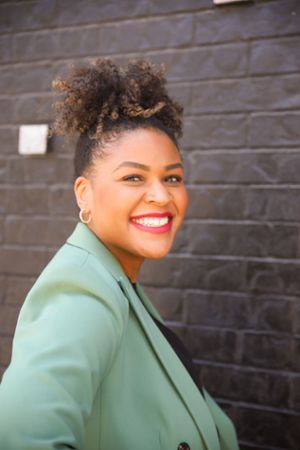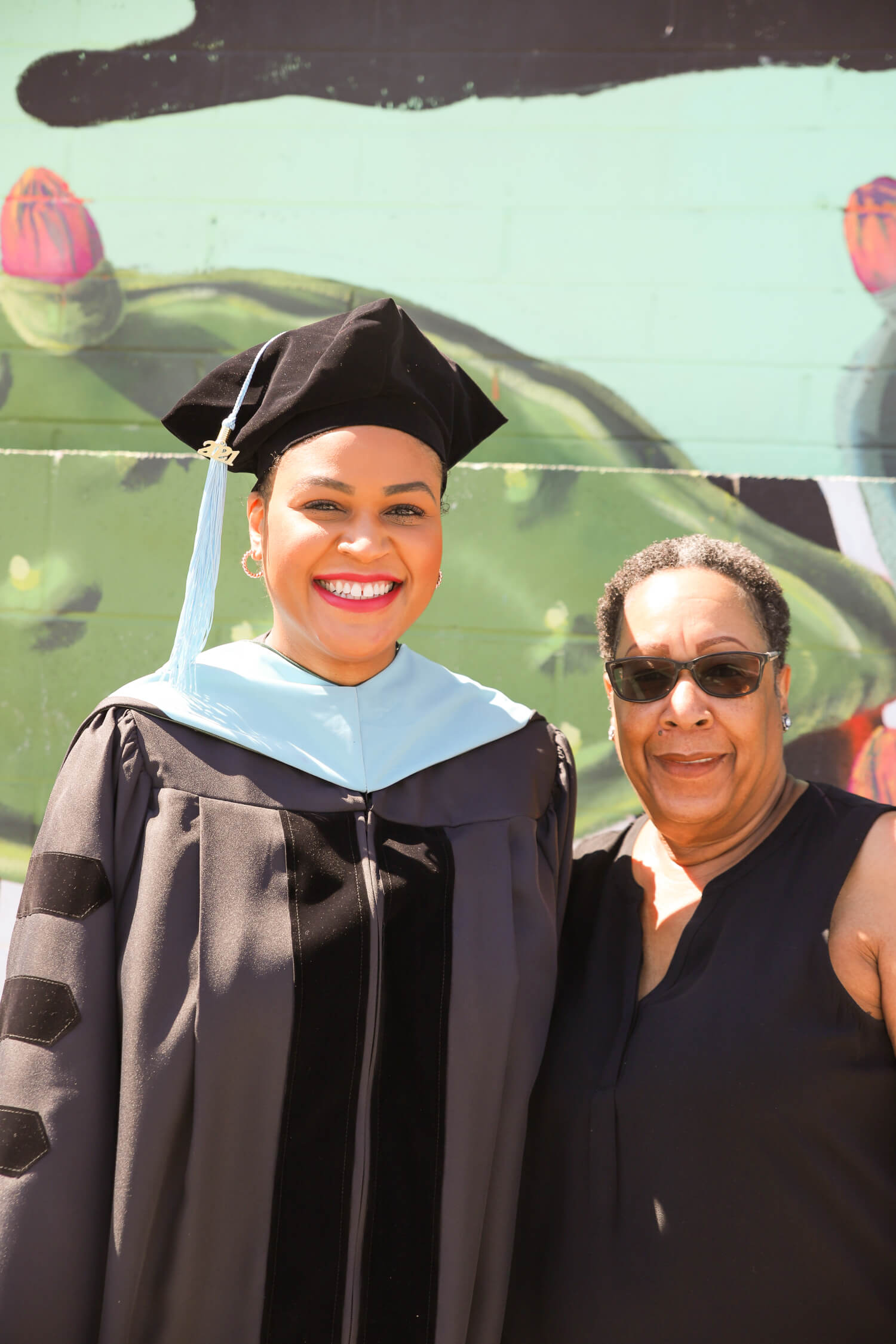As part of First-Generation College Student Celebration Week, the Office of the Provost presents a series of reflections from first generation faculty and staff.
Dr. Amber Benton is assistant dean for diversity, equity, and inclusion in the College of Natural Science.
Did your parents or guardian help you go to college? What are/were their vocations?
I grew up in a single-parent home with my mother and she really pushed me to go to college. Neither she nor my father attended college because it seemed (at the time) that they could make a livable wage. Growing up, my mother worked as an administrative assistant for an aerospace company. Since she did not have the opportunity to attend college, it was important to her that I attend and graduate from a four-year college or university. While she did not attend college, learning was always important to my mother. At a young age, she instilled in me the importance of learning and that no one can take away your knowledge. She always found a way to buy me books or expose me to different learning opportunities.
What were your first moments or months on campus like? Are there any specific memories that stand out?
My family and I could not afford to do college visits so it was my first time seeing the campus. My mother and stepfather drove me from Nevada (my hometown) to Oregon for New Student Orientation. I remember thinking the campus was so large and beautiful even though I eventually learned it was a small campus. Specifically, on move-in day, there were students and staff that greeted us to help us unpack and move me into my dorm room. The president of the university was also there to greet us and helped move some of my stuff as well and I thought that was especially meaningful. I also remember being on campus and thinking “I am the only one.”
I learned quickly that I was one of two Black first year students at my college. But I was the only Black woman first year student. Due to this, I had some moments of feeling isolated and homesick, especially coming from a city that is very racially diverse. Despite these differences, I managed to connect with people on my floor rather quickly and my roommate became one of my best friends.
How did your parents/family/guardian prepare you for college? How did you prepare?
My mother always said, “I may not know the answers but I can always ask questions.” So, that’s what she did. My mother inquired about college preparation resources at my high school and she read information online and that helped us prepare for going to college. She made sure I was prepared to take the pre-SATs, the SATs, the ACTs, and Advanced Placement (AP) exams. I could not afford fancy college prep or SAT/ACT courses to prepare for the exams. However, I took AP/IB courses in high school. My mother and my grandmother bought me books to prepare for the SAT and ACT which included practice exams. Once I signed up for exams, I was also able to receive literature about different colleges. I also had several extracurricular activities that I participated in that I enjoyed, but that would also look great on college applications. Some of those activities were joining clubs in high school but I was also a saxophonist in our symphony band and marching band. I also volunteered at a local rec center which eventually became my part-time job so I could try to save money for college.
Why did you decide to go to college?
I grew up in a low-income home and I wanted to create more opportunities for myself and my family. I knew that if I had at least a bachelor’s degree, it would open more doors for me and increase my chances of having a higher income than my family’s income. I also enjoyed school and learning and wanted to continue my education. Not going to college was never an option for me.
Ironically, in high school, my mother and I spoke with my guidance counselor regarding my options for college. I was a high achieving student with practically a 4.0 GPA, taking AP courses, and active in different organizations including marching and symphonic band so I wanted to know what types of colleges would be best for me. My guidance counselor actually told me that he did not think I would get into many colleges and I should lower my expectations. He told me that I should not waste my time applying to too many colleges. I should limit my choices to two. We took his advice and I only applied to two colleges.
As a first-gen student, how was the application and admission process? How did you navigate this?
Back then, technology and college applications were not what we have today. Applying to college and then completing the FAFSA was more laborious. I filled out my applications by myself since I would be solely responsible for paying for my education. I provided the information they asked and did not ask any questions. For the institutions I applied to, I defaulted to their recommendations without doing (or knowing) to do more research.
What were your first semesters at school like? What surprised you the most?
I remember classes were very challenging. I was studying biology and Spanish so many of my first-year classes were introductory science courses, Calculus I, and advanced-level Spanish. Despite taking AP courses in high school, I did not perform well my first semester. I actually ended up on academic probation after my first semester. I did not understand why at first because I took AP courses and I was spending so many hours on coursework and studying. After a conversation with one of my professors, I realized I was not adequately prepared for the academic rigor of college. I did not understand how to properly prepare for class or study for college-level courses. I was repeating habits from high school and that was not good enough in college. I needed to focus on understanding the material and connecting concepts. However, my college did not offer “academic success skills workshops” or have a robust tutoring center that you now find at institutions like MSU. I solely had to rely on help from my professors’ office hours.
The thing that surprised me the most was the level of freedom I had as a student and young adult. I was responsible for every decision I made or didn’t make during my time in college. I was excited by the fact that I could create the direction of my life and did not need anyone’s permission to do so.
What challenges did you run into as a first-gen student?
Besides the academic challenges, I was often challenged by imposter syndrome, which intensified with me being one of a few Black students on campus. While many people had good intentions, there were times that I felt like I was not good enough or that my professors did not see my potential. I often did not have the language to describe some of my experiences as a student. I desperately wanted someone to relate to, either a professor or student, and it did not exist for me.
I also could not rely on my family for financial help. I had to work during school and I often did not go home for breaks because of finances.
The other challenge I experienced was preparation for graduate school. As a first generation student, I was so focused on the undergraduate experience and graduating that I was unaware of the opportunity to pursue graduate education. I did not find sufficient support to help me learn about graduate school, as a first gen student, and how to afford graduate school.
How long did it take you to get acclimated to university life?
I believe it took the entire first year to acclimate to university life and living in another state. (I was an out-of-state student.) However, I went to a small, liberal arts college and they did two great things to help first year students adjust: a strong orientation program and a first-year seminar. Our orientation took place days before classes began. During that time, we learned about the campus, had a community cookout with our families, discovered resources through a scavenger hunt, and we took a day trip to Hagg Lake.
In addition, all first-year students were required to take a first-year seminar course. All of my classmates were people from my floor in our residence hall. The course was impactful on my college experience. Our professor challenged us to think critically and drastically improved my writing skills. However, he also took us to explore Portland, the nearest major city, and we were able to learn about the social and economic challenges in the city by visiting a youth homeless shelter. We also had cultural experiences like experiencing the Portland Symphony Orchestra.
Were there any systems of support for first-gen students at your school?
There were no formal systems of support for first-gen students. As a first-gen student, I did not know that I should even be looking for systems of support. Due to the size of the school and the time, there were limited resources for student support.
As a first-gen student, what perspectives do you have that other non-first-gen students might not?
For me, I had and have multiple marginalized identities, so being a first-gen student was not the only aspect of my identity. However, being a first-gen student allowed me to experience college in a way that non-first gen students may have taken for granted. It allowed me to see the world differently than some of my peers. I was able to learn to navigate and adapt to a system that was completely foreign to me. In many cases, that caused me to learn about how different offices operate and meet new people working at the university, because I often had to ask questions or seek guidance. This often provided me with more insight than my peers who felt like they did not need such services.
I was very resilient because I felt I did not have much choice otherwise. Despite being on academic probation, I had to bounce back and graduate if I wanted to take advantage of better opportunities in life. I also needed to perform well academically if I wanted to continue to receive certain scholarships and grants.
By being first-gen, a Woman of Color, and coming from a low-income background, I appreciated every opportunity that college presented me. When I received opportunities, such as becoming a Student Ambassador, I gladly accepted. I became a resident assistant and took my first white water rafting trip. My major required us to study abroad so I selected Spain as my destination so I could explore Europe.
I was also able to explore the surrounding community in a way that others did not. I became a Big Sister and volunteered at the local elementary my “little sister” attended.
Looking back, what’s one thing you wish you could tell your younger self at the beginning of your college career?
Keep trying because everything will work out the way it is supposed to for you.
Do you have any advice for other first-gen students?
First, look into the “sticker price” of colleges and then assess what types of financial resources are available to you.
While finances are important, I recommend for students to look into institution type and what resources they provide. Find out what the university provides for your academic and social well-being.

